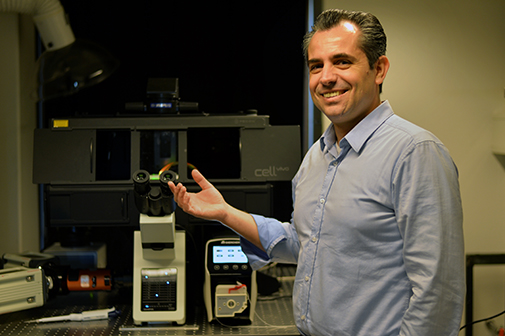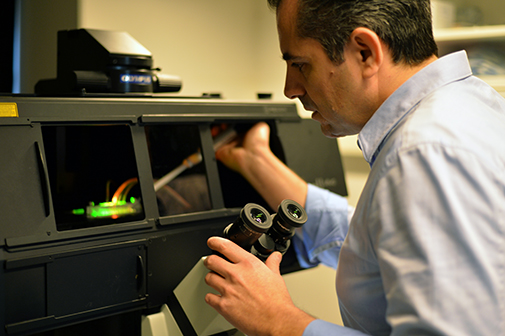Carlsberg Foundation Distinguished Associate Professor Fellowship
Nikos Hatzakis has been awarded Carlsberg Foundation Distinguished Associate Professor Fellowship. The fellowships are awarded for outstanding newly appointed associate professors with international experience to establish an independent research group or environment

The scope of the grant is to help newly appointed distinguished associate professors to establish independent career and establish a world leading network. Within the grant Hatzakis will expand his collaboration with world leading experts in protein engineering and de novo protein design. The grant is 2.4 mill DKK and will cover PhD students salaries and an “add on” to his single molecule microscopes upgrading them for single molecule FCS and lifetime measurements.

Nikos in front of the microscopes used for single molecule studies
Nikos Hatzakis is Associate Professor at Department of Chemistry and member of the Steering group in Center for Synthetic Biology. His interest is to obtain a fundamental understanding of the parameters underlying regulation of enzymatic function. Enzymes regulate a plethora of vital cellular processes and aberration in their function can result in countless disease states. They are also essential components in multiple industrial applications including drug synthesis and detergent development. Harnessing the biomolecular insights of current single molecule experiments allows us to unmask the structural and functional dynamics of major drug metabolism enzymes. Understanding how these enzymes operate paves the way for the design of novel pharmaceutics.
 Understanding enzyme behaviour
Understanding enzyme behaviour
Enzyme function combines the capacity to proficiently accelerate a chemical reaction with the functional plasticity of accepting a spectrum of structurally diverse substrates. Understanding and controlling enzyme function is central component for the design of enzymes with functionalities as catalysts outside the cell – for synthetic biology applications, bioremediation, and even the generation of novel biofuels, and for the in silico design of novel pharmaceutics. Recent breakthroughs on de novo design of enzymes – the salient test of our understanding of enzyme behaviour – achieved to bring about new artificial enzymes. However, the tremendous catalytic proficiencies of naturally occurring enzymes are, as yet, unmatched in any artificial enzyme, in no small part due to the need of integration into the design process the way conformational dynamics encode function

The main objective of the research in the Hatzakis group is to augment our understanding on how conformational dynamics encode enzymes’ capacity to accelerate chemical transformations while maintaining the functional plasticity of accepting structurally diverse substrates and utilize this knowledge both for protein and novel ligand design. Within this grant we will approach this formidable challenge by an eclectic mix of techniques - borrowed from whichever area of experimental science that promises to shed light on the behaviour of enzymes. We will capitalise and expand our single molecule readout capacities, and establish or/and extend collaboration with the leading groups of protein engineering, in silico protein and drug design and medical groups on metabolic disorders. As an oversimplified example an enzyme is a car engine, a nanomachine. Multiple manufacturers can built car engines, but to built and tune the technological marvels involved in formula 1 racing cars requires knowledge beyond state of the art. In a way this fellowship will allow us to capitalize on the momentum built by the recent Villum young investigator fellowship and help us to achieve the fundamental understanding on how protein work that is required for creating a new wave of tailor made biocatalysts
The Carlsberg Foundation Fellowship is entitled:
Role of conformational DYNamics on enzyme FUNCTION (from single molecule insights to Rational de novo protein design)
Contact
Nikos Hatzakis, Associate Professor
Department of Chemistry
Nano-Science center
Faculty of Science
Email hatzakis@nano.ku.dk
Read more
News story about Nikos Hatzakis' work:
Bacteria’s Achilles heel uncovered by single molecule chemistry
